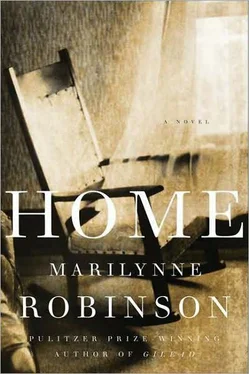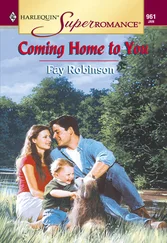After a little while she went back to the house, thinking her father might be waiting up. But Jack had gotten him to bed and had gone upstairs to his room. The porch light was left on for her.
THE NEXT MORNING SHE ROSE EARLY, EARLY ENOUGH THAT she could assume Jack was still sleeping, and she went downstairs to the kitchen, measured out coffee and made pancake batter, and then waited to hear her father stir, as he always did well before dawn, though it was his custom to wait to rouse himself until she came downstairs an hour or two later. Mornings were worst for him, and the tedium of lying awake wore on him, she knew. This morning and from now on she would do better by him. He loved pancakes. She would make them often.
So when she heard him stirring, she started the coffeepot and the griddle, then she went into his room and helped him up, held his arm while he stepped into his slippers, bundled him into his robe. She brought a washcloth for his face and hands, and combed his hair.
“Ready to greet the day, more or less,” he said.
She said, “Pancakes.”
“Yes, that’s wonderful. I heard you out there and I thought it was part of a dream I was having. I don’t remember the dream, but it had footsteps in it.”
It had not occurred to her to look at the clock, assuming that, since she awoke feeling purposeful, with a highly formed intention in her mind, it must be the dark of the morning. The clock on her father’s dresser said 3:10. He saw her look at it.
“Pancakes are always welcome!” he said, mustering himself.
“I can let you sleep for a couple more hours, Papa.”
“Not at all! The smell of coffee,” he said, “has put all thought of sleep behind me! Yes!” and he moved with halting resolution toward the kitchen, and took his chair, and sat looking alertly at nothing in particular. So she gave him a plate and a knife and fork.
“I’m afraid you children might not be getting along,” he said. This remark was so apt and abrupt it brought tears to her eyes. She turned to the business of making pancakes and said, when she could trust her voice, “It is hard, you know, after so many years — I was young when he left for school, and we were never close—” and she put a pancake on his plate. He took up his fork. She poured another pancake. “And I do think he feels uneasy with me. I’m not at ease with him, that’s a fact, and I might as well be honest about it—”
She set the second pancake on the first, and her father said, “If you’ll put my foot on the stove there,” and something else, and she realized he was asleep. He was asleep with his fork in his hand and a sociable expression on his face. She couldn’t find it in her heart to wake him again, so she turned off the coffee and the griddle and the ceiling light and sat down at the table, too. And when she found she couldn’t hold up her head, she rested it on her arms, and wept a little, and drowsed a little. And then she heard Jack on the stairs.
It was still long before dawn, so he switched on the light and as quickly switched it off again. He whispered, “What’s wrong?”
She said, “Nothing, really.”
“You’re crying.”
“That’s true.”
“Is he all right?”
“He’s sound asleep. You can turn the light on.”
The light came on, and Jack stood in the doorway taking in the situation. “I did smell coffee,” he said.
His father stirred in his chair, and Jack slipped the fork out of his hand. “It’d be a shame to waste those pancakes,” he said.
“They’re cold.”
“They’re still pancakes. Do you mind?”
“I don’t mind. And there’s the cold coffee, too.”
“Excellent,” he said. “Thank you.” He took his father’s plate and cup, filled the cup with coffee, and sat down to the pancakes. “This is nice in its way. But it’s a little strange. I don’t mean that as criticism.” Then he said, “You’re really not going to explain this, are you.”
“No, it doesn’t matter. I don’t feel like it.”
“Okay.” He laughed. “I’m always willing to play by the house rules.” Then he said, “When we finish our breakfast, can we go back to bed?”
“No.”
“I suppose I should have guessed that.”
“He almost never sleeps this soundly. I’m not going to disturb him. But I don’t want him to be confused when he wakes up. I’ll stay here. You can go back to bed.”
Jack watched his father for a moment. Then he stood up, put one arm under his knees and the other around his shoulders, and lifted him out of his chair. The old man murmured, and he said, “You’re fine, sir. It’s Jack.” A hand floated up to touch his face, his cheek and ear. Jack carried him into his room and tucked him into his bed. Then he came back to the kitchen.
“Now you can get some more sleep,” he said.
Glory said, “Thank you, I will.” And she went upstairs and lay on her bed and hated her life until morning.
WHEN MORNING CAME, SHE WENT DOWN TO THE KITCHEN and made coffee and pancakes, as if for the first time. Jack’s expression was opaque. Her father was drowsy, or he was pensive. Finally he said, “I have something on my mind. ‘Last night I saw the new moon with the old moon in his arm.’ What is that? I’ve been trying to think.”
She said, “‘The Ballad of Sir Patrick Spens.’”
Jack said, “Good for you, college girl.”
“No,” the old man said. “She was an English teacher. In high school. A very fine teacher of English, for a number of years. Then she got married, so she had to resign. They made them do that. ‘The new moon with the old moon in his arm.’ That is a very sad song. A number of times I heard my grandmother sing it, and it was very sad. ‘Oh forty miles off Aberdour ’tis fifty fathoms deep, and there lies good Sir Patrick Spens with the Scots lairds at his feet.’ She said the life was very difficult in Scotland, but she was always homesick. She said she would die of the homesickness, and maybe she did, but she took her time about it. She was ninety-eight when she died.” He laughed. “‘We that are young will never see so much nor live so long.’” He said, “You just picked me up and carried me, didn’t you, Jack. Well, that’s all right. I’m not the father you remember, I know that.”
Jack put his hand to his brow. “Of course you are. I didn’t — I’m sorry—”
“No matter. Never mind. I shouldn’t have mentioned it.”
The color left Jack’s face. After a moment he pushed back his chair. “Well,” he said. “There’s work to be done.” He went out to the garden and stood in the path he had made along the iris beds and lighted a cigarette. Glory watched him from the porch. She said, “I should probably help him.”
The old man said, “Yes, dear, that would be good of you.” So she settled her father in the Morris chair with the newspaper, and then she went out to the garden. She touched Jack’s arm and he looked at her.
“What is it?” he said.
“I just wanted to say that there was nothing wrong with what you did. He hates being feeble. And he’s had to put up with it for a long time.”
He drew on his cigarette. “Thank you,” he said.
“No, really. I thought it was gallant. A beau geste. A demonstration of your fabled charm.”
“Too bad. I’ve found that people weary of my fabled charm.”
“Well, I guess I haven’t had much chance to weary of it.”
He laughed. “The day is young.” Then he said, “I didn’t intend anything when I said college girl. I don’t know what was offensive about it.”
“It wasn’t offensive. He just wants to make sure you think well of me. He’s afraid we don’t get along.”
He looked at her, studied her. “He said that?”
Читать дальше












